CIRCULATION: 1,900 IN ACT & REGION
Informing the Canberra medical community since 1988


Health co-op collapses
Celebrate your team


CIRCULATION: 1,900 IN ACT & REGION
Informing the Canberra medical community since 1988


Celebrate your team

Negotiations are slowly progressing between Canberra Health Services management and doctors across the various hospital departments, after a disastrous couple of months that have decimated public orthopaedics.
“It’s like the clean-up operation after a train wreck,” said AMA ACT president Dr Kerrie Aust. “The last few months have been so difficult and disruptive across many sections of our hospital system, and our patients deserve better.
“Canberra just cannot afford to lose any more doctors.”
“pause” in conversations about controversial reforms that impinge on clinical autonomy.
“Listening is the first step, and then there actually has to be an adequate response to constructive feedback,” Dr Aust said.
6 out of 14 surgeons in CHS’s orthopaedics department have resigned since March, including Professor Paul Smith, Dr Sindy Vrancic, Dr Nicholas Tsai and Dr Alexander Burns. The hospital has also lost two anaesthetists, and trauma surgeon Dr Ailene Fitzgerald has stepped down from her executive position.
However, tensions have been brewing for months, the result of CHS’s controversial new Operations Centre, established in December to coordinate patient movement through the healthcare system, including for triage, diagnosis and surgery. The model has not been successfully demonstrated anywhere in the world, and doctors say it’s been interfering with and over-riding their clinical decisions.


The sudden resignations of so many senior staff followed a snap decision by CHS not to renew the contracts of VMOs being paid on a fee-for-service basis – instead, they would be offered new contracts with salaried or sessional rates.
Dr Vrancic told ABC News: "There comes a time when interference with my capacity to offer that care by [an] external Operations Centre is now reaching a point where I can't put my hand on my heart and offer the care that I believe that our community deserves because of budgetary constraints.”
Speaking off-the record, several surgeons including VMOs and salaried specialists, told Canberra Doctor the Operations Centre has prevented surgeons from attending certain procedures where their expertise was

Dr Aust said some doctors were taking heart from an apparent “positive shift” in their negotiations with management in recent days, including a comment from the Health Minister that the Government was pressing Continued page 2
required; from prioritising patients they deemed more urgent; and from performing operations in circumstances they strongly believed were best for patients.


I spend a lot of my week meeting with doctors and healthcare staff working in a diverse array of settings across the ACT health system. One thing that’s strikingly obvious from my visits is that where investments are being made to support our medical workforce, they’re paying off.
Junior medical officers working at Canberra Health Services are speaking more optimistically about their workplace than I’ve heard for a long time. While the work is extremely demanding and they’re holding out for a much-deserved pay rise, on-thewhole they’re able to access the training opportunities they need, and they’re feeling supported.
This is no coincidence: CHS has made deliberate investments over the last couple of years to improve the experiences of junior medical staff. They’ve listened to JMOs, and made significant improvements when it comes to rosters, overtime, allocated teaching time and psychological support. All this has had a hugely
Several of these surgeons said they were aware of situations where they believed the Operations Centre’s decision-making led to adverse outcomes for patients.
AMA ACT has also been contacted by doctors in other areas of the health system, angry at how the Operations Centre is eroding clinical autonomy.
Time to pause
ACT Health Minister Rachel Stephen-Smith has been meeting with different craft groups across the hospital, and on April 1 acknowledged the Government needed to “take a pause in this conversation about how the
positive impact on the hospital culture for trainee doctors.
I cannot help but contrast this with the experience of our senior doctors, in the wake of so many well-loved and respected consultants tendering their resignations in recent weeks. These highly trained and extremely skilled professionals take on enormous responsibility and medico-legal risk in their roles, overseeing what is sometimes a staggering caseload, all while teaching and training the next generation of doctors. Those who have left will be sorely missed.
After a tumultuous few weeks, I’m relieved to see the Health Minister and CHS pressing pause on some of the ill-considered organisational changes that have driven senior doctors to resign. The question is, what next? What a difference it would make, if our health system recognised the valuable work senior doctors are doing and supported them as it has our junior doctors recently.
It’s no secret that membership organisations around Australia are facing really challenging times, and AMA ACT is no different. While we’ve had stable membership numbers for several years, we need to be looking at our long-term financial viability.
Operations Centre and the planned care work is being implemented”.
“We always knew that it would be a challenging conversation with clinicians about changing the way we undertake our planned care structures, but it is really about providing greater transparency, greater fairness and improved throughput for our elective surgery and procedural waiting lists,” she told ABC Radio. “The majority of those teams have come to the table to have that conversation in a really constructive way, so I want to thank them for that.”
One senior doctor told Canberra Doctor they were hopeful the ongoing negotiations would lead

That’s why over the coming months, the AMA ACT Board will be holding discussions with our members in the ACT about the best model for us in the future. We will be carefully considering the path forward after hearing what our members have to say, so please – if you’re a member, get involved in the discussion.
We take very seriously the goal of ensuring doctors in the ACT are strongly represented now and into the future. You may
have heard me speaking on ABC Radio or 2CC recently, or read my comments in the Canberra newspapers, emphasising the importance of clinical autonomy in the hospital system and continuity of care in the community. We’ve had an enormous amount of positive feedback on our recent social media posts around these issues. Please keep liking us on Facebook, to get these important messages out to the wider community. Because when doctors are well-supported, patient care is always going to be better.
NOT YET AN AMA MEMBER? Scan the QR code to find out about joining.
to increased clinical oversight of the Operations Centre.
“Of course, the last thing anyone wants is catastrophic disaster because the Operations Centre directed a doctor to do something that takes them away from a patient who needs them more,” they said.
CHS has recently introduced an escalation pathway which makes the Clinical Director for Surgery the final decision maker where there is a difference of opinion between a surgeon and the Operations Centre.
A CHS spokesperson said: “This ensures that there is a senior, independent clinician as the
decision maker when there is a disagreement between specialties, as can sometimes happen with access to theatres.”
“CHS recognises the critical importance of surgeons’ clinical decision-making and encourages all CHS surgeons to discuss their concerns with the Clinical Director.”
As the debate has evolved, Dr Kerrie Aust has been on the front foot in the media, talking about why clinical autonomy is essential to safe, evidence-based patient care.
“Patients have an expectation that it's going to be doctors advocating
for them when it comes to their procedures because doctors are in the best position to understand the urgency based on the clinical presentation and based on how well they know the patient,” she told 2CC radio. “Doctors are not interchangeable widgets,” she said. “This is not a case of, where any doctor can do any procedure at any time. These are people who have very high levels of skills. They’re very good at understanding their own scopes of practice, and those of their colleagues, and they know when to say, 'Yes this person is best on my list', or to chat with a colleague and put them on somebody else’s."

GREG SCHMIDT
Senior Workplace Relations Advisor, AMA ACT
Canberra’s public sector doctors are waiting expectantly for a pay rise decision from the Fair Work Commission.
More than three years after unsuccessful enterprise agreement negotiations began, a Full Bench of the Fair Work Commission heard evidence over two days at the beginning of March from representatives of public sector doctors and their employer, the ACT Government. It had earlier been agreed that most elements of the expired Medical Practitioners Enterprise Agreement 20212022 (MPEA) had been reviewed and updated as necessary –with the significant exception of the increases to salaries and allowances, along with the way that the Medical Education Expenses allowance would be paid for Senior Medical Practitioners.
AMA ACT made written submissions to the Full Bench that included technical evidence from the Australian Bureau of Statistics (CPI data), Productivity Commission (Report on Government Services) and the Reserve Bank of Australia (Statement on Monetary Policy). We also quoted the Government’s workplace policy from the ACT Government Health Workforce Strategy 2023-32 document and an earlier Canberra Health Services Annual Report.
In addition to the technical evidence, two JMO members provided statements to the Fair Work Commission outlining the impact that cost of living pressures had had on them and their families during the last three years. Our thanks to those members for assisting the case and stepping up on behalf of all our JMO members. During the two-day hearing,
our counsel introduced and expanded on this evidence, all of which was accepted by the Fair Work Commission. The ACT Government did not seek to examine any of our AMA witnesses, indicating that the Government did not challenge our primary evidence.
AMA ACT argued that Medical Practitioners should receive a pay increase at the beginning of each year covered by the FWC determination that is equal to the CPI inflation figure for the previous year, plus a 1% wage catchup to reverse the effects of previous erosion of real wages. In practice, our submissions put the case for:
a 6.58% increase to salaries from January 2023;
a 5.45% increase from January 2024;
a 3.62% increase from January 2025; and
a 4.1% increase from January 2026 (based on CPI forecasts).
The ACT Government maintained its earlier position on wage increases, viz. a small salary increase from January 2023, then further small increases in June and December through each of the years 2023, 2024 and 2025.
The Full Bench is currently considering the submissions and documentary evidence put forward by the AMA and ASMOF and the ACT Government, as well as submissions by other employee representatives. While we don’t know just what the Full Bench ruling will be (or when it will be published) we know that the determination must be consistent with an outcome that the parties might have reasonably achieved if bargaining had proceeded to a successful conclusion. It is therefore almost certain that the Full Bench will determine that pay increases should be backpaid from January 2023, with a number of subsequent pay increases, and very likely that the quantum of pay increases will be somewhere within the range that the various parties argued for.
This means that we can reasonably expect that the efforts of AMA ACT, with other advocates supporting, will result in ACT public sector
doctors receiving backdated pay increases that are substantially higher than the increases already offered by the employer.
A decision is likely to be published by the Fair Work Commission before the end of May, and we expect that public sector medical practitioners will be paid at their new rates of pay almost immediately, with salary backpayments being made some weeks or months later.
The decision will be published as a comprehensive Workplace Determination that operates in lieu of an enterprise agreement until it is replaced by the next round of agreement-making.

Gabrielle Sullivan, Principal at Sullivans Legal Co represented AMA ACT. She told Canberra Doctor:
“The Territory wants medical practitioners to accept the same pay increases it had offered to all other ACT public servants. AMA ACT has always objected to this, because these increases were below inflation. That’s where the enterprise bargaining became intractable, and unions have asked the Fair Work Commission to step in.
“The legal powers for the FWC to intervene are
relatively new, so it’s a bit hard to work out how significant this case will be. At least for the ACT, and possibly nationally, we can expect some tribunal guidance on the priority to be given to preserving real wages in circumstances where the employer has other wage-setting agendas. We await the decision, which we expect to be handed down within a month or so.”

We are excited to announce the opening of our two newest collection centres.
Gungahlin Marketplace
Shops 27-28, Ground Floor
Open Mon-Fri 7am-6pm Sat 7.30am to 1.30pm
Casey Shop 1, Casey Market Town
Open Mon-Fri 7am-3pm
Appointments available all day. Patients can visit capitalpath.com.au/appointments to make an appointment.



The collapse of a health clinic that has cared for many of Canberra’s most vulnerable people will be felt throughout the health system, with warnings the biggest impacts will be on drug and alcohol services, mental health services and emergency departments.
Interchange Health Co-op closed its doors in April, after six years of providing high quality, 100 per cent bulk-billed general practice and allied health services.
Around 5000 patients, including 350 on an opioid maintenance program, are now left looking for alternative health care providers.
In a statement, the Interchange board said it had been left with no choice but to make the “deeply difficult and disappointing decision”.
“As an organisation that is heavily reliant on Medicare rebates, a small
number of government project grants, and membership fees to sustain our services, it has been extremely challenging to raise sufficient income to cover true operational costs,” they said.
“Despite an intensive recruitment program over several months to fill GP vacancies and increase our overall GP numbers, our 100 per cent bulk-billed business model is no longer able to meet current market rates and conditions to attract much-needed doctors into our Practice, putting our services under intense pressure.”
Government action needed
Dr Kerrie Aust described the closure as “devastating”.
“The doctors and support team at Interchange were doing so much of the heavy lifting with complex, vulnerable patients, and their staff would always go so far above and beyond,” she said.
“This is going to hurt a lot of vulnerable patients in Canberra, and put further pressure on our
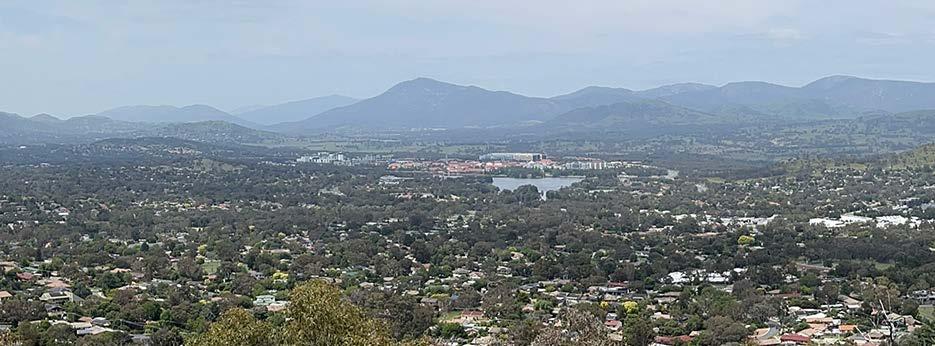
city’s stretched drug and alcohol services, mental health services and emergency departments.”
Dr Aust urged all levels of government to pitch in to support the transition of the Co-op’s patients to alternative providers. “What we’ve seen with Interchange is consistent with long-spoken warnings that without substantial change to funding arrangements for general practice in Australia, practices will continue to fold,” Dr Aust said.
“The bulk-billing incentives recently announced by the major parties are unfortunately too little to keep bulk-billing practices in Canberra alive,” Dr Aust added. “Many practices in Canberra have done the modelling on the incentives – they’re just not enough.”
AMA has been calling on the Federal Government to thoroughly reform Medicare so that GPs can spend time with patients with complex
As a doctor, you know more than most the costs involved in providing medical care in Australia. To help cover these costs when care is provided in hospital, all private insurance hospital policies include medical gap cover which can help to cover the difference, in whole or in part, between 75 per cent of the Medicare Schedule Benefit (MBS) and a doctor’s fees.
Medical gap cover at Doctors’ Health Fund
At Doctors’ Health Fund we offer two different types of medical gap covers and the type you have depends on the level of cover you choose.
Our entry-level hospital cover, Smart Starter Bronze Plus, and market-level Gold hospital cover, Prime Choice Gold, include medical gap cover called Access Gap Cover. This medical gap cover could be said to be comparable to medical gap covers provided by other health funds. If your doctor chooses to bill according to this scheme, they can either charge at the ‘no gap’ fees or alternatively, charge a ‘known gap’ of up to $500. This gap amount is per practitioner for the episode of care, so each doctor involved in your surgery/treatment could charge $500, including your anaesthetist.
Top Cover Gold hospital cover provides medical benefits up to the AMA list of services and fees. This level of cover is unique to us, and this medical gap cover pays above the Medicare
Benefits Schedule (MBS) and other medical gap schemes.
From 1 July 2024, we introduced a new $750 excess option to Top Cover Gold, lowering the upfront premium you pay.
What are the benefits of having medical gap cover up to the AMA list of services and fees?
There are benefits to having medical gap cover up to the AMA list of services and fees compared to other medical gap cover schemes:
Minimal out-of-pocket expenses – benefits payable under this gap cover are above the Medicare Benefits Schedule (MBS) and other medical gap schemes. Patients are left with no out-of-pocket expenses for medical bills when doctors charge up to the AMA list of services and fees.
Less admin for doctors – unlike other medical gap covers, there’s no ‘opt in’ needed by treating doctors to charge AMA fees and for benefits to be paid. If you charge up to the AMA fees, we’ll pay them, and your patient will be left with no out-of-pocket costs for your services. Giving more peace of mind on their and your part.
Benefits focus on the appropriate remuneration for doctor’s services – Doctors’ Health Fund believe the AMA list of services and fees provide reasonable remuneration to
health needs. The Modernise Medicare plan proposes a better structure for GP consultation items and funding to support more nurses and allied health professionals in general practice. Interchange has advised former patients in need of care to contact their nearest Urgent Medicare Clinic, or alternatively, Opioid Treatment Services at The Canberra Hospital, Directions Health in Woden, or Winnunga Nimmityjah Aboriginal Health and Community Services.
doctors for their years of training, expertise, and experience.
Founded by AMA NSW in 1977, and offering rebates based on the AMA’s list of services and fees for some time, Doctors’ Health are committed to ensuring doctor-patients and their treating doctors can feel confident and comfortable when it comes to the charging of fees. The Doctors’ Health Fund is a member of the Avant Mutual Group.
With the 3 May election in their sights, Labor promised some of the biggest investments in health in recent memory in their March budget. Yet while the funding boost is welcome, there were many missed opportunities. AMA is working hard to keep health in the spotlight, in the hope of seeing muchneeded reforms announced in the weeks ahead.
The big ticket item in the budget is a record $7.9 billion investment to expand the bulk billing incentive eligibility to cover all Australians from 1 November 2025. It’s the largest single investment in Medicare since its creation over 40 years ago, and one that the Liberals have promised to match. While Labor claims it will lead to nine out of 10 GP visits being bulk billed by 2030, the reality is that the incentive amounts to an additional $20 per consult. It seems unlikely that many GPs in the ACT will deem this sufficient to meet the costs of a private consult, when the average outof-pocket cost for a standard consult is more than double that amount.
Through our Modernise Medicare
campaign, AMA has been calling on the government to reform the Medicare rebate structure to enable GPs to spend more time with patients, to meet the challenges of the growing burden of complex and chronic disease.
In the ACT, the vast majority of public hospital funding (68%) comes from the territory government. This is the highest proportion in the country, and far above the national average state contribution of 61%. AMA has been calling on the federal government to increase its share of hospital funding nation-wide to 50% and lift the funding cap.
Labor’s 2025 budget increases the Commonwealth contribution to public hospitals by 12% to reach a record $33.9 billion in 2025–26. While the additional funding will go some way to helping our increasingly logjammed public hospitals improve their performance, it won’t reach anywhere near 50% of the funding share in the ACT. What’s more, the rubber only hits the road once the National Health Reform Agreement is finalised.
AMA President Dr Danielle McMullen described the promised investments as “little more than a nice idea if states and territories fail to reach an agreement with the federal government”.
“The party that wins the election will need to expedite finalising


the National Health Reform Agreement,” she said.
A big win in the budget is the government’s promise of increased funding towards growing the GP workforce and supporting GP registrars. This investment will fund a $30,000 salary incentive for GP registrars, and paid parental leave and study leave. Additional prevocational and vocational training positions in general practice are also now locked in. These measures represent a big win for national AMA advocacy and will help address the AMA's predicted shortage of GPs. Sadly, the government missed an opportunity in its budget to support thorough and evidenced-based workforce planning by not establishing an independent health workforce
agency. Since the abolition of Health Workforce Australia, we haven’t had an independent body dedicated to ensuring Australia’s medical workforce is distributed where it’s needed, improving access to healthcare for all.
The government has committed to establishing a further 50 Medicare Urgent Care Clinics. While the blueprint for these centres is that they are GP-led, the ACT has been granted an exemption to run the service through its existing nurse-led Walk-in Centres, and has pledged to use the funding to open a new nurse-led centre in Woden.
Now 15 years since the first Walkin Centre opened, an independent evaluation is long overdue, including a review of the actual cost per service. This is especially important in the



context of this year’s $350 million blowout in the ACT’s budget deficit.
The government has promised that if re-elected it will reduce the maximum co-payment for medicines under the PBS from $31.60 to $25.00 per script – a 20-year low – and freeze the cost at $7.70 for pensioners.
AMA was disappointed not to see the government come to the party on our proposed tax on sugary drinks. This was a missed opportunity to tackle obesity and chronic disease while raising $3.6 billion in government revenue over the forward estimates — funds that could be invested in crucial preventive health measures.
Junior doctors’ fight to reclaim unrostered unpaid overtime is progressing, with approximately 1600 registering for a settlement scheme worth $31.5 million.
Lawyer Hayden Stephens, who has been representing the doctors together with Gordon Legal, said his team were currently moving through the early stages in the claims process. “Over the coming weeks, registered
claimants will receive an email with a Notice of Claim, inviting them to log on and complete their claim details,”
he said. “Claimants will also be offered an online interview with a staff member to support them through that process.”
The process involves clarifying the claimants’ employment data, the hospital where they worked, and the departments where they performed unrostered unpaid overtime.
“The claims process will take approximately 12–14 months
to complete, with distribution of payments likely to occur later this year and into early 2026,” Mr Stephens said.
AMA President Dr Kerrie Aust has paid tribute to the courage shown by the lead plaintiff in the class action, Dr Ying Ying Tham. “A hierarchical workplace can lead to a culture of silence among those who are most junior. This settlement is made possible by Dr Tham’s enormous courage in speaking up,” Dr Aust said.
ACT Health is inviting health professionals to register for one of its information forums on voluntary assisted dying.
The forums are designed to ensure all health professionals feel informed and supported about voluntary assisted dying, which will be available to eligible people in the ACT from 3 November 2025.
The forums will cover how

voluntary assisted dying services will be implemented in the ACT; obligations as a health professional under the law; how to become a voluntary assisted dying practitioner; and what support will be available. Participants will be able to ask questions and network with other health professionals.
Each forum is in-person only and will include the same content.
For a list of dates and to register, go to act.gov.au and search for voluntary assisted dying. For inquiries, email ACTHD-VAD@act.gov.au
The Stress Reset System takes a unique psychophysical approach to dealing with stress. Most people describe stress as a feeling, rather than a thought process – “I feel drained”, “I can’t relax”, “my legs feel heavy”, “I feel tired, yet I can’t sleep”. That’s why targeting the physical response to stress, with an approach that positively impacts on the central nervous system, can effectively change the way an individual both feels and thinks.
Ordinarily, it is hard to change a person’s thought processes, which are often random and disruptive. However, the SRS approach enables people to “move in a way they cannot move on their own” in order to “re-feel the way they think”.
The SRS was pioneered and developed here in Canberra, as an early intervention program for frontline government workers who had been exposed to critical incidents. The pilot found SRS was associated with an improvement in self-reported health and wellbeing, sleep quality, stress and range of motion.
One of the most striking findings of the pilot was that a large majority of these frontline workers, when asked about their perceived stressors, described physical sensations rather than thoughts as their primary concern. Many participants weren’t aware that they had lost a considerable range of movement in a relatively short period of time – i.e. they went from being able to touch their toes to suddenly not being able to reach their shins, with associated muscle and joint discomfort, and would often exhibit behavioural traits that were out of character and were adversely impacting on their home/workplace relationships. This limitation makes physical interventions such as exercises appear overwhelming and somewhat unattractive despite the strong scientific evidence suggesting otherwise.
This is where the SRS comes into its own. SRS utilises an internationally patented portable movement technology that allows the user to perform balanced and coordinated movements in a sequential manner, whereby the limbs of the body are positioned so that the correct alignment of spine is central to the whole movement process. A positive neuromuscular response can be felt sometimes in a mere matter of minutes, making it a wonderful mindfulness tool.
The SRS approach is based on Fit-to-Manage’s internationally patented movement systems, designed to re-establish neuromuscular function as a means of normalising the physical and emotional response to stress.
The SRS has been designed to work on two fronts:
1. A targeted physical response that has been designed to wind down the central nervous system.
2. Replacing random thought processes that are often disruptive and of a negative nature, with more positive thought processes, in which feelings and thoughts are integrated.
The SRS emphasises:
Small, coordinated movements performed in a controlled and focused manner
Sequential movement patterns that progressively normalise physical movement patterns so that thought processes can relate to giving a sense of control
A spine-first approach, where correct posture is developed from the ground up
Upper-limb-controlled lower limb movement, ensuring correct spinal alignment
The SRS system is designed to be affordable: the take-home apparatus, together with a tailored one-hour initial appointment is $300. Follow-up sessions are available on request $143.
Fit-to-Manage founders Bronwyn and Stuart are both ex-Olympic athletes, having represented Australia at Commonwealth and Olympic levels in their respective sports of track & field, bobsleigh and rowing. Through this they gained a broad knowledge of functional human movement, including through Stuart’s own personal recovery from a horrific bobsled accident.
Bronwyn is a registered psychologist and has worked with both athletes and the general public, employing Acceptance and Commitment Therapy techniques. Stuart is an accomplished mechanical designer and has developed the company’s patented rehabilitation devices. We should not exercise the body without the joint assistance of the

To find out more visit www.fittomanage.com.au or call 02 6282 7077 For psychology sessions visit www.psychologistscanberra.com.au or call 02 6282 3302


Stuart Andrews: “Resilience is not always about whether you can get back on your feet again …. more often than not, it’s whether you can get comfortable lying down – sleep matters.”
Bronwyn Thompson: "When you are stressed, what is the first thing you lose and the last thing you realised you have lost?........your range of movement."
“The high-pressure conditions of elite sport can mean athletes are constantly in fight or flight mode, their mind racing and body flooded with adrenalin and cortisol. The Lower Limber is a brilliant system for monitoring athletes’ stress levels and reversing the physical contraction caused by these stress hormones, which if left unaddressed, limit the athletes’ ability to think clearly and perform at their best.”
Dr Samantha Graham High performance mind coach
“I love the fresh and innovative approach that Stuart and Bronwyn have come up with to help me deal with my stress levels. I have tried meditation, mindfulness and exercise classes, however, these approaches did not grab me and I ended up quitting. This approach allowed me to analyse and address the effects that my stress levels were having on my body and was so easy to implement and commit to.”
Jenny Holbeck, Client
It’s just over a year since GP Obstetrician
Dr Sarah Jensen led the establishment of First Steps Pregnancy Support in Queanbeyan to provide comprehensive care to local pregnant or newly parenting women in crisis.
There is increasing demand for the service, which has seen almost 40 women in its first 12 months, providing over 400 medical, nursing and social work appointments in addition to a range of other supports. 21% of clients were aged 18 or younger; 32% were Aboriginal or Torres Strait Islander; 32% were culturally and linguistically diverse and 18% were Medicare ineligible.
“The primary thing we do is give these women time,” Dr Jensen said. “Time to build rapport and trust. Time to be able to discuss what’s actually going on in their lives.”
Dr Jensen became acutely aware of the gap in care for women in difficult situations through her work over the past decade as a GP Obstetrician in private practice and at Queanbeyan Hospital.
“An unplanned pregnancy can be the tipping point for a woman, turning her difficult life circumstances such as unemployment, an unsupportive relationship, unstable housing, substance use and mental illness into a crisis,” Dr Jensen said.
“The 16500 billing code that GPs must use for antenatal
appointments – with a meagre
$45.65 Medicare rebate irrespective of time spent – is completely inadequate for addressing even the medical requirements of good pregnancy care, let alone the social complexities many women are facing.”
Dr Jensen said that by spending more time with pregnant women who were facing challenging situations, and demonstrating the practical support and medical care that First Steps is able to offer free of charge, her team were “seeing women empowered and equipped to choose motherhood, where they might otherwise have felt there was no other realistic option but to end the pregnancy”.
Dr Jensen said First Steps provides “a safe, non-judgemental place where a woman can feel seen and heard and take the time to make the decision that is right for her”.
“I have very good relationships with several of the clinical staff who work at the local clinic that offers termination services because I work with them in the hospital setting, so they know about us and they have referred a few women here when they thought they were being coerced, or when women were too far along for their services,” Dr Jensen said.
About a third of First Steps’ patients have come through selfreferral, while others have come through GPs, hospital maternity departments in Queanbeyan and Canberra and organisations including Barnardos Australia, Campbell Page, NSW Department

of Communities and Justice, and Teen Clinic, to name a few.
In addition to clinical consults and case management with the centre’s social worker, First Steps provides birth classes, cooking classes, a playgroup, pre-loved baby and maternity clothes and the Circle of Security parenting program.
First Steps has a host of volunteers, including a midwife/ lactation consultant, playgroup helpers, and several “grandmas” who welcome women while they are awaiting their appointments. While the initial volunteer intake came mainly from friends and family of the

team, Dr Jensen said the most recent intake comes largely from the wider community “which has been really encouraging”.
Each week Dr Jensen juggles her time at the clinic with a 24hour on call shift at Queanbeyan Hospital and a day in general practice. She says starting First Steps has been a huge amount of work, requiring her to spend a lot of time on behind-the-scenes activities such as grant-writing, marketing and rostering in addition to her clinical role.
“The responsibility of running
a medical not-for-profit is overwhelming at times, but overall it’s such a joy doing this work and I couldn’t not do it,” she said.
A multi-year grant from John James Foundation has enabled First Steps to get up and running, funding the renovation and opening of their Queanbeyan Clinic. Other generous donors include Snow Foundation, Community Bank (Bungendore, Braidwood, Crookwell branches), Inger Rice Foundation and QueanbeyanPalerang Regional Council.

The ACT is transitioning its trial of pharmacy prescribing into regular practice at more community pharmacies, despite no evaluation of the data.
Fifteen pharmacies across Canberra have been participating in a set of NSW Government trials which train pharmacists to manage uncomplicated UTIs, resupply oral contraceptives, and treat specific skin conditions.
According to NSW Health, an evaluation of data from the UTI treatment phase of the trial is currently in the final stages of completion, before review by the Ministry of Health.
Data from the second phase of the trial, regarding re-supply of the oral contraceptive pill, is not due until later in 2025. The third phase of the trial, involving pharmacy consultations and prescribing for impetigo, herpes zoster, mild atopic dermatitis and acute mild plaque psoriasis is still ongoing, with data due to be provided in 2026.
Nevertheless, ACT Health Minister Rachel Stephen-Smith announced
in February that in the ACT, the contraception and UTI trials are “transitioning to regular practice at more community pharmacies”.
“All eligible ACT community pharmacies will be invited to offer support for women with uncomplicated urinary tract infections and those who need a re-supply of their contraceptive pill, following the completion of the NSW Health Pharmacy trial,” Ms Stephen-Smith said.
To be eligible, pharmacists must complete an accredited course through the Pharmaceutical Society of Australia or the Australasian College of Pharmacy.
Ms Stephen-Smith said the clinical trials had seen more than 780 consultations for Canberra women aged 18-65 presenting with symptoms of uncomplicated UTIs, and 176 consultations for Canberrans seeking re-supply of the oral contraceptive pill. No data has been released on adverse events or the proportion of patients who needed to see a GP afterwards or go to hospital.
AMA ACT President Dr Kerrie Aust commented: “It is incredible that these trials are being lauded a success and transitioned to regular practice, before the results

have even been considered.”
“The evidence out of Queensland shows that autonomous pharmacy prescribing is not riskfree,” she said. “What looks like an uncomplicated UTI can actually be a sexually transmitted infection or a pregnancy, and this is easily missed by someone without medical training and experience.”
AMA Queensland surveyed more than 1,300 doctors across the state in 2022 and found 240 cases where doctors had to
treat patients who experienced complications as a result of participating in the Urinary Tract Infection Pharmacy Pilot. The most common misdiagnosis was having a sexually transmitted infection rather than UTI. Furthermore, one in two participating pharmacists said they would have found it difficult to not sell antibiotics after charging patients the $20 consultation fee, according to an evaluation of the pilot.
Dr Aust commented: “While it might seem convenient to the patient, there is a serious conflict of interest when the dispenser is also the prescriber.”
“Autonomous pharmacy prescribing just doesn’t fit with the goals of evidence-based patient-centred care and good antibiotic stewardship.”
“There is no substitute for the quality care you get from a GP who knows you and your history.”
Associate Professor Maryse Badawy has recently established a new general practice in Deakin, Canberra Family Health Centre.
A/Prof Badawy has practiced nationally and internationally over many years. She has held academic roles at Griffith University and is a previous president of the Gold Coast Branch of the AMA.
Her qualifications include MBBS, FRACGP, FHKAM (Family Medicine), Grad Dip Fam Med and Master Family Medicine. Canberra Family Health Centre is dedicated to providing comprehensive, patientfocused healthcare for individuals and families. For new patient bookings or more information please call 02 5133 7112 or visit cfhc.com.au.

Are you new in town? Or has your practise welcomed a new doctor? We’d love to help you get the word out to referring doctors by running a profile in the next edition of Canberra Doctor. It’s easy – just scan the QR code.


DR ANTONIO DI DIO Director Australian Professional Services Review Agency
The Medical Benevolent Association of NSW-ACT has been supporting doctors in hardship since 1896. I joined in about 1999 and it’s been a great privilege. Whether it’s final-year medical students, early-career doctors, consultants, those approaching retirement, or the families of deceased doctors, the need for support continues to grow.
While we’ve expanded our services to include social work, counselling, financial advice, and career counselling, we are still best known for providing financial assistance during times of crisis. This support relieves enormous stress and allows doctors to focus on recovery and rebuilding their lives.
However, in the past five years, the gap between those donating and those needing financial assistance has reached a critical level. At our recent Council Meeting in February, we were only able to fund 40% of requests—far below our historical average of 65%.
Some of the cases we reviewed were heartbreaking. Critically ill doctors, unable to work, had depleted their savings and could no longer afford essential medical care. Others, including young women doctors escaping domestic violence, faced homelessness while struggling to rebuild their lives. With limited funds, we were forced to make difficult choices—do we prioritise medical costs or housing?
Then an idea struck me. Many of us already offer discounted or bulk-billed services to colleagues in need. What if we formalised this? If the MBA could coordinate a list of doctors willing to see a few colleagues each year for little or no gap, we could redirect our financial resources to essentials like housing, groceries, and utilities.
Excited by the prospect, I sent an SMS to 40 of my Canberra colleagues. Every single one said yes. Many even told me they had never billed another doctor. Their generosity was humbling—but not surprising. Canberra’s medical community is compassionate, and when a colleague is in need, we step up.
So, instead of a “call for help,” this article has become a thankyou letter. But in my enthusiasm, I may have missed you. If you’d like to join the list, we’d love to have you—it would mean seeing just one or two extra doctor-patients a year. To those already giving their time, money, or services
The Canberra Hospital Switchboard team gets a special shout-out this edition of Canberra Doctor for always being approachable and willing to help.
“They’re such a wonderful team,” Dr Aust says. “When I was a junior doctor, I remember them always being so kind, and recently when I was unsure who to refer a patient to, they helped me find the right consultant and facilitate handover.”
Julian Czoban has worked at Canberra Hospital for 30 years, and on the Switchboard for 27. While most of the calls he takes are from members of the public, he is also there to support doctors and other health professionals find the right people and places in the hospital.
“I enjoy making people smile,” says Julian. “I’ve been here for so long. I enjoy getting to know the doctors and watching the junior doctors go from their intern stripes to becoming consultants; I’ve made
some decent friends and keep in contact with them regularly.”
“The junior doctors get to know the Switchboard team; they come and pick up the pager from us, and then if they have any pager issues they come back to us. We have
I enjoy getting to know the doctors and watching the junior doctors go from their intern stripes to becoming consultants
Julian Czoban CHS Switchboard
chats with them over the phone if they struggle with something and then we just help them find

(remember – not everyone has the facility to bulk bill, and many of them give so greatly in other ways)—thank you. Your generosity is truly life-saving. If you’d like to contribute financially, a QR code is included below for easy donations.
And if I haven’t reached out to you yet, consider this your invitation. A bigger list means a lighter load for everyone. Contact me via Canberra Doctor or reach out to our Executive Officer, Louise Fallon, at 0433 162 869.
To contribute financially, please use the QR code.
their way around the hospital.”
Outside of work Julian is an avid gardener, with a balcony full of bonsais. He is particularly fond of his juniper and jade plants, which he prunes into shapes, and is always happy to help friends with their plants.
Also on the Switchboard team is Rebecca Burgmann, who has worked alongside Julian for the last four years. Rebecca says she’s glad to help callers in any way she can, to ensure the best possible outcomes for patients.
“I had a caller a while ago, a daughter calling on behalf of her mother, wanting to be connected to someone who could advise her on her mother’s care. I did a bit of running around and got through to a cancer specialist nurse in the area where the patient was admitted. I found out later from the specialist nurse that it all worked out well for the patient. They’re the kind of moments that make this work so worthwhile,” Rebecca said.

Outside of work, Rebecca plays roller derby, representing Canberra at different tournaments around Australia. She’s expecting a baby

soon, and says she’ll need to hang up her skates once bub arrives, however she hopes to be back in the rink before too long.
Do you have a wonderful team? Email us a photo of your team with a description of who you are and why you work so well together. We’ll publish your photo in the next Canberra Doctor and send you a Drs4Drs scrub cap and travel mug for each member of your team.
AMA ACT members can now access a wider range of perks and discounts, including the full range of benefits available to AMA NSW members. Member benefits include exclusive travel and lifestyle deals, such as discounted membership of the Qantas Club and Virgin




Australia Lounge, discounted car hire, and preferential pricing when buying a new car. Members also benefit from exclusive rates on professional and financial services, including saving up to 50% on job advertisements on the MJA Jobs Board, and up to 50% on subscription to the clinical resource UpToDate.














The full list of member benefits can be easily viewed online by logging onto the AMA member portal, a one-stop shop for all members’ needs, also offering easy access to the AMA Fees List, the Medical Journal of Australia and doctors’ health services. It’s all part of AMA’s continuing effort to provide exceptional value and support to members.




















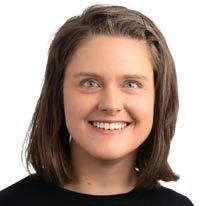
STACY LEAVENS
Capital Health Network CEO
Primary health care professionals are often the first point of health professional contact for victim-survivors of family, domestic and sexual violence (FDSV). With that in mind, a new program is helping GPs and practice staff gain greater confidence to play their role in FDSV prevention, early identification and responding to disclosures.
Capital Health Network (CHN) has established the FDSV Training and Link Worker Support Program in the ACT, with funding from the Australian Government.
The program is being delivered by CHN’s new Family Safety Team, which is expertly advised by Dr Anita Hutchison, a GP who, with her own lived and clinical experience, is in a unique position to provide specific advice and input into the development and delivery of the Pilot activities. Also co-delivering the program are the Domestic Violence Crisis Service (DVCS) and Canberra Rape Crisis Centre (CRCC).
The program aims to support primary health care professionals to recognise and respond to early signs of FDSV through:
a range of free, RACGPaccredited, tailored and trauma-informed training and resources for the ‘whole-ofpractice’ (non-clinical and clinical staff, including allied health staff within general practices and Aboriginal Community Controlled Health Services in the ACT).
Link Workers embedded within DVCS and CRCC, providing a one-stop referral and advice point for practice staff, facilitating coordination of referrals from general practices to relevant support services, improving integration between primary health care and the FDSV sector, and enhancing service navigation for victim-survivors.
By participating in CHN’s FDSV Program, general practices will gain:
a one-off financial incentive of $5000 to offset staff time associated with undertaking training
mastery of respectful inquiry strategies and mechanisms to support victim-survivors
debriefing support from Link Workers
improved understanding of mandatory reporting requirements and legal responsibilities when supporting patients experiencing FDSV
improved understanding of FDSV referral pathways.
Abuse and violence in relationships can be hard to spot, both for the victim-survivor and for the GP. The signs may be subtle at first and gradually increase over time. Eventually the victim-survivor may feel they don’t know what ‘normal’ is meant to feel like, or what a healthy relationship is meant to look like.
By piecing together their history, and recognising signs, symptoms and patterns early on, GPs can apply their expertise to respond to FDSV. It is a good approach to consider the high prevalence of abuse and violence in your patients and in the wider community, and to reflect upon
this in all patients presenting with chronic conditions such as migraines, gynaecological problems, mental health issues, pain and addictions. This list is not exhaustive, but these are common examples of clinical signs and symptoms, which upon deeper inquiry can lead to pattern recognition of FDSV.
Disclosures come from feeling safe and valued in the presence of a GP. It may take months or years of 15-minute consultations to gain the trust of a vulnerable person. When trust is gained, it can help to use leading statements like ‘we know that people with chronic medical conditions often have had a history of trauma, maybe something has happened to you in the past, or is happening now, do you think that might also be the case for you?’
If a patient is comfortable
enough to disclose, your response as their GP may change the trajectory of their life. An invalidating response not only fosters doubt in the patient’s mind, but also nurtures feelings of shame, which may further traumatise them.
The LIVES (Listen Inquire
Validate Enhance Safety and Support) approach from the World Health Organisation was designed to structure your response to disclosures, so that you ‘do no harm’ whilst giving emotional and practical support to your patients.
The approach does not have to be linear and should not be a 'tick box exercise'. Responses to abuse and violence are not ‘one size fits all’ and may be dynamic depending on the current situation, level of risk and most importantly, in conjunction with the wishes of the patient.

Practices can sign up by 30 June for the FDSV Training and Link Worker Support Program by contacting CHN’s Family Safety Team: familysafety@chnact.org.au or 02 6287 8080.
Listen
Take time to promote trust and sense of safety
Believe the patient
Listen with empathy
Inquire
What does the patient need?
What are the concerns or fears of the patient?
What can you do to help?
Validate
Believe your patient and validate their experience
‘This is not your fault; you did nothing wrong’
‘You deserve to feel safe at home’
Enhance Safety
Consider the safety and needs of any children who may be impacted
Examine the level of risk based on the patient’s judgement
Ask about their current supports and plans, in case of an emergency
Support
Collaborate to provide supports they need from you, now and in the future
Facilitate warm referrals through the support of FDSV Pilot Link Workers. You can access Link Worker contact details by emailing: familysafety@chnact.org.au
Respect your patient’s wishes, walk the journey alongside them, not for them
Did you know that in addition to running the doctors’ helpline, Drs4Drs ACT organises regular events to support doctors in the Canberra region?
Safe Space gatherings are held several times a year at AMA offices in Barton, and are designed to help doctors build and contribute to a supportive network in the medical community, while also developing personal habits to underpin a sustainable career.
At the most recent Safe Space event in March, Dr Jill Van Acker, Chief Medical Wellbeing Officer at Canberra Health Services spoke about the keys to successful mentoring relationships, including a discussion of different models and stages
in the mentoring relationship.
Dr Marisa Magiros, medical director of Drs4Drs ACT reflected:
“Dr Van Acker gave a fantastic presentation that helped us reflect on the importance of mentorship for professional development, personal growth and overall wellbeing.”
“In a healthy mentoring relationship, the mentor demonstrates professional vulnerability and the mentee drives the process,” she said. “Mentor-mentee relationships are most effective when there are shared values, mutual respect, trust and availability.”
A rich discussion followed between attendees and panellists
Dr Jill Van Acker, Professor Walter Abhayaratna, Dr Jo Crookes and Dr Kerrie Aust.
The group discussed ways to foster informal and formal mentorship relationships
for different career stages and transition points; as well as for different group needs including medical specialty, International Medical Graduates, unaccredited registrars and LGBTQI+ practitioners. The intention is to continue these conversations to influence change. Participants also had the option of joining in on an energising morning 5km parkrun/walk around Lake Burley Griffin, and a thought-provoking creative writing workshop led by Associate Professor Antonio Di Dio. Safe Space events are open to doctors and medical students across the ACT and region.
The Drs4Drs ACT 24/7 telephone helpline is 1300 374 377.
Save the date for future Safe Space
Wed 14 May
Sun 22 June ‘Safe Space 9’ in person
Wed 30 July Specialist Networking Dinner
Thu 21 August Online combined ACT & Tas educational event 7-8pm
Sat 18 October ‘Safe Space 10’ in person
As part of the ACT Government’s efforts to enhance road safety, a new mandatory reporting requirement for health practitioners will come into effect on 12 June.
The new regulation mandates that health practitioners registered in the medical, occupational therapy, physiotherapy, optometry, and psychology professions report to Access Canberra if they form an opinion that a patient who holds or is applying for a heavy vehicle licence has a condition likely to impair their ability to drive safely.
Austroads’ Assessing Fitness to Drive is used to guide health practitioners when assessing a person’s fitness to drive. It also contains information on conditions that may affect fitness to drive and types of heavy vehicle licence. The report must be made in writing within 7 days of forming an
The conversation we all need to have with adolescent patients

As a psychologist, I have witnessed a decline in adolescent mental health since the smartphone era began, a trend American social psychologist and author Jonathan Haidt examines in his book The Anxious Generation Haidt links this concerning trend to a “phone-based childhood”, where
social media replaces real-world interaction with comparison and isolation. He highlights a post2010 surge in teen anxiety and depression, coinciding with the rise of platforms like Instagram. He argues social media disrupts play, sleep and focus, fostering instant gratification over resilience.
In Canberra, the ACT Government implemented a bold measure: from Term 1, 2024, P-10 students in public schools cannot use phones or smartwatches during the school day. Year 11-12 students must silence and store devices during class. Developed with over 3,200 community inputs, this “phoneaway” policy aims to reduce distractions and cyberbullying, with principals managing exemptions.
A survey of nearly 1,000 NSW principals found that after a similar policy was implemented in NSW, 87% of students were less distracted and 81% showed improved learning.
All this is extremely relevant to those who work in primary care. GPs see the effects of excessive screen time on youth daily—teenagers presenting with stress, headaches, or sleep issues. Adolescents fixated on social media metrics may exhibit somatic symptoms, worsened by sleep loss—what Haidt calls “foundational harms.” Health practitioners are uniquely placed to help this anxious generation. Asking, “How do you use your phone?” or “What’s your bedtime routine?” can reveal contributing factors. Leveraging off the ACT’s phone away policy, we can say: “Your school’s policy helps— let’s reinforce it with better habits”. Haidt’s studies show swift improvements following a monthlong social media break. There’s plenty of hope for these kids. It might just take someone like you to start the conversation with them and guide them towards greater balance.
opinion about the person’s fitness to drive. There does not need to be a formal diagnosis. Health practitioners will be required to take all reasonable steps to tell the person as soon as practicable about the report and its contents. The report must contain the person’s name, address, date of
birth and the nature of the condition affecting the person’s driving ability. Please note that information cannot be disclosed to Access Canberra from a person’s My Health Record without their consent. For more details, health practitioners can visit the City Services website.

360UV Skin Cancer Clinic is looking for a dedicated General Practitioner.
The successful applicant will work with Dr Taylor and become part of the professional team performing skin checks, surgical and non-surgical intervention for 360UV patients.
LEADING SKIN CANCER CLINIC IN CANBERRA
IN PARTNERSHIP WITH DR ALASTAIR TAYLOR (SPECIALIST PLASTIC SURGEON)
WORKING WITH A TEAM OF QUALIFIED AND EXPERIENCED SKIN CANCER SPECIALISTS

SURGICAL UPSKILLING PROVIDED
LICENSED AND ACCREDITED HOSPITAL FACILITIES
MASTERS IN SKIN CANCER DIAGNOSTICS AND TREATMENT IS DESIRABLE, OR WILLINGNESS TO UNDERTAKE FURTHER TRAINING
For some of us, if we are lucky, we find work we are passionate about or see as our vocation. It may not always be easy, but we are drawn to it. Thirty years ago, Canberra-raised, Dr Rose McGready found herself in such a situation.
Keenly interested in tropical medicine and working in remote communities, Dr McGready left her job in Darwin and joined a small medical team working in the Shoklo refugee camp in Thailand’s Tak province. This camp was home to around 9000 displaced people fleeing the desperate conditions created by the escalating conflict in Myanmar. There were two main health providers in the camp, Shoklo Malaria Research Unit (SMRU)

and Médicins Sans Frontièrs. In a mini epidemic of malaria, each weekday Dr McGready travelled with a medical team to screen and treat pregnant women with this life-threatening disease. Fast forward to 2025, Prof McGready still works at the border between Thailand (Tak Province) and Karen (Kayin) State in eastern Myanmar and is a Professor of Tropical Maternal and Child Health at Oxford University and the Deputy Director of the SMRU. She is recognised as a leading authority on malaria during pregnancy and its effects on foetal development. Her work is a unique mixture of humanitarian assistance and research, with her efforts still focusing on improving the health and well-being of mothers and infants from marginalised communities in this border region.
Prof McGready and her dedicated team run four permanent clinics – two on either side of the border and 16 outreach clinics in remote areas of the region. The clinics provide antenatal care and safe birth services for more than 100 women per month and have a 24hour birthing service. In 2009, Prof McGready working with Adrienne White through Australian Volunteers International, created a sustainable healthcare model to employ and
The sudden passing of Dr Kevin Tee in February has affected many in the Canberra medical community. A GP registrar at Next Practice Deakin and an academic registrar at ANU, Kevin’s warmth and care left a lasting impression on many who knew him.
By Dr Paresh Dawda, Director, Next Practice Deakin
“In the nine months he spent with us at Next Practice Deakin, Kevin quickly became an integral part of our practice family. He developed a loyal following of patients who greatly valued his warmth, care, and clinical
skill. Kevin’s genuine compassion and dedication were clear to all who knew him — something exemplified when one of his patients, along with their carer, broke down in tears upon hearing of his sudden passing. Kevin consistently went above and beyond in his care for patients. He was a deeply reflective practitioner, always seeking ways to improve his practice and enhance the care he provided. Insightful, thoughtful, and committed, he was the kind of doctor who left a lasting impression. Amongst his colleagues — fellow doctors, nurses, reception staff, and allied health team members — Kevin was equally respected and liked. He quickly became part of the fabric of the practice, taking an active role in team building events and projects, and contributing with enthusiasm, leadership, and good humour. Kevin’s passing leaves a significant
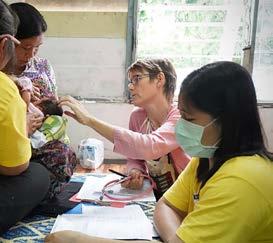
train local healthcare workers in an environment where the pre-existing health infrastructure had collapsed. While 30 years ago, multi-drugresistant malaria in the region was widespread with 100 cases of falciparum malaria presented daily, Prof McGready and her team have developed a treatment for malaria in pregnancy that has reduced the cases in many of her clinics to zero. Her team has conducted the largest number of randomised controlled trials for this treatment globally and was the first to randomise artemisinin-based therapy in the first trimester. The treatment plan is recognised by WHO and routinely is used globally, particularly in Africa.
Prof McGready and her team’s efforts are challenged by the brutality and escalating conflicts of decades of repressive military dictatorship in Myanmar. The

constant displacement of local communities and the volume of Karen and other Burmese people fleeing Myanmar has significantly increased since the outbreak of civil war in 2021. Civilians have been tortured including the sexual abuse of women, while villagers including children are forced to work as slave labour and minesweepers. Currently there is also forced conscription of males and females. Atrocities including
raiding and burning of villages and more recently, aerial bombings alongside changes in international funding mean delivering healthcare programs such as those provided by Prof McGready and her team is extraordinarily challenging. In 2022, friends of Prof McGready set up a registered charity to raise funds to assist her and her team’s life-saving work. The Foundation operates solely with the support of volunteers.

gap in our team, and he will be missed by patients, colleagues, and the wider community alike.
He displayed all the hallmarks of an excellent general practitioner — compassionate, curious, collaborative, and constantly striving to improve the care he provided.”
By Clinical Professor Katrina Anderson Acting Head of General Practice, ANU School of Medicine and Psychology
“Dr Kevin Tee was a GP registrar undertaking an academic post within the Academic Unit of General Practice, ANU School of Medicine and Psychology. He also worked as a General Practitioner at Next Practice, Deakin and as a hospital doctor at John James Private Hospital. He was about to start
his PhD researching preventative medications and patient adherence. Kevin was an ANU Medical School medical student from 2017 until 2020. Prior to that Kevin was an economist and chartered accountant who had worked in the Department of Treasury. After medical school Kevin went on to do his prevocational training at the Canberra Hospital and his GP training with the RACGP. During his hospital and registrar training years Kevin has contributed to student teaching across all years of the medical school but particularly in 2024 he was involved formally with third year student teaching. Kevin cared about his patients deeply and was an outstanding personcentred doctor. He was a kind, humble and thoughtful teacher. He was always generous with his time, happy to help and mentored many students and junior doctors during

Dr Kevin Tee.
his training. He was a delightful colleague; he had a curious and deeply intellectual mind and a passion to help others and improve the world. He will be missed by so many whom he touched over these years. Kevin died unexpectedly. Our thoughts and prayers go out to his family who are devastated by this tragic loss.”
With a federal election on 3 May, Medicare and bulk billing are hot topics once again.
Keeping up with regulatory changes is essential for medical professionals and practices, as these updates directly affect how you work and get remunerated.
The Government has announced significant changes to bulk billing incentives, including the introduction of a new Bulk Billing Practice Incentive Program. These updates aim to encourage more GP practices to bulk bill all patients.
From 1 November 2025, new rules around bulk billing will take effect, with initial support from both major political parties. The changes include:
New bulk billing practice incentive program.
The Bulk Billing Practice Incentive Program will be introduced, which will provide additional financial support to practices that commit to fully bulk billing all patients.
Expanded bulk billing eligibility.
Currently, GPs receive incentive payments for bulk billing of children under 16 and concession cardholders.
From November 2025, this incentive will extend to cover all Medicare-eligible patients.
The goal is to increase accessibility and encourage more practices to adopt bulk billing.
An extra 12.5% loading payment for every $1 earned through MBS benefits.
Quarterly incentive payments, with payment split between the GP and the practice.
Marketing support to help you promote your bulk billing services.
To be eligible for the program, you must:
Fully bulk bill all general practice nonreferred attendance services.
Advertise your participation in the program.
Be registered with MyMedicare.
Quarterly payments will be made to participating GPs and practices, beginning in early 2026.
No need to track bulk billing data manually –Services Australia will handle monitoring, and quarterly payments will be processed automatically.
These changes are designed to improve patient access to healthcare while ensuring that medical practices are financially supported. If your practice is considering joining the Bulk Billing Practice Incentive Program, now is the time to review your eligibility requirements and weigh up the financial benefits.
Talk to one of our expert team members today to stay informed and make sure your practice is ready for the upcoming changes.





AMA ACT President
Dr Kerrie Aust paid a visit to the GP Liaison Unit and Outpatient Department at North Canberra Hospital in April and would have happily stayed there all day.

“What really came across were the smiles that the team members exchanged as they talked about the culture of the unit and the ‘high trust’ environment. It is no easy task coordinating 42 consultants across 15 specialities, but the team seem focused on using good systems and great relationships,” Dr Aust said.
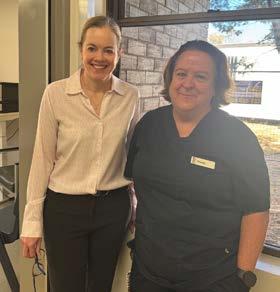
Dr Aust asked the teams what they were proud of and the answers came thick and fast.
“Some real highlights over the last 12 months were the work Dr Frank Piscioneri has led to actively manage their surgical wait lists, and the establishment of the new high risk breast cancer clinic,” Dr Aust reflected.
“Shelley commented that the great relationship between nurses and doctors means that they can ‘solve problems in the corridor’ before they become big issues.
“We will be talking more to the team in the future about the strategies they are adopting to address some of the wicked problems in wait lists, communication and doing more with a tight budget.”

GP Dr Wee-Sian Woon sends a Shout Out to psychiatrist Dr Emma Adams, “who was generous in her time, knowledge and wisdom in presenting a very engaging and valuable 1.5 hour presentation on Pharmacological Management of Adult ADHD for our ACT ADHD Special Interest Group for GPs which I co-convene to 22 GPs.”
Dr Kerrie Aust sends Shout Outs to Dr Rakesh Iyer and Dr Nithin Kolanu “for their advice and management of one of my patients. It is wonderful to be able to get quick advice and keep patients out of hospital.”
If you can think of an outstanding colleague who deserves credit for something they’ve done, please let us know at editorial@ama-act.com.au and we’ll include your Shout Out in our next edition.

The Medical Women’s Society (ACT & Region) held its annual Cocktail Party on 12 March 2025, in celebration of International Women’s Day. The event had almost 60 people in attendance, almost half of whom were medical students.
The Medical Women’s Society works to support and further the professional development
of medical women, including medical students, both in the ACT and in the surrounding NSW towns.
The Society advocates for the health and welfare of all Australians, particularly women and children through its work with various organisations. Its fundraising activities have supported organisations including Kitchen of Hope, Companion House and Karinya House, as well as work in the Solomon Islands.
To join, please email Dr Linda Welberry (MWS Secretary) or Dr Julie Beuth (MWS Membership Secretary) at mwsact@gmail. com Alternatively visit act.afmw.org.au for more details.
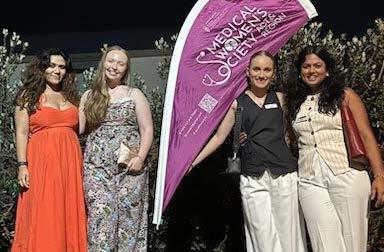
Over 50 medical students and junior medical officers attended Capital Health Network’s recent GP careers event, hearing how to unlock a diverse and rewarding GP career.
Explore GP had a noticeable impact on participants’ likelihood of pursuing a career as a GP. Following the event, there was an increase in participants who expressed they were likely to pursue a career as a GP (93%). Also, participants who felt confident in their knowledge of GP careers more than doubled (89%).
ANU Medical Student Stephanie




reflected: “I liked hearing about incomes, pathways and portfolio careers e.g. doing parttime GP, part-time policy and working in private practice.”
Junior doctor, Dr Nandar, commented: “I felt very connected and found this event helpful for my future career planning.”
ANU Medical Student Mikayla said: “One thing I worried about was not having a good worklife balance, so after hearing how much GPs value a work-life balance, I feel much more inclined towards general practice.”
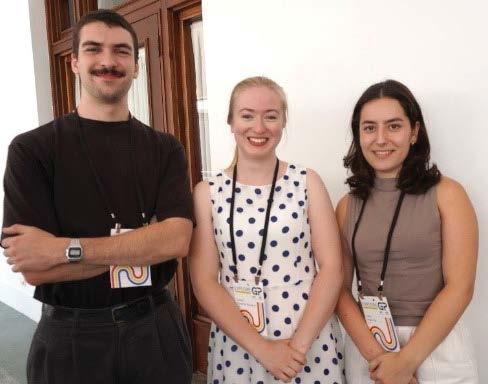
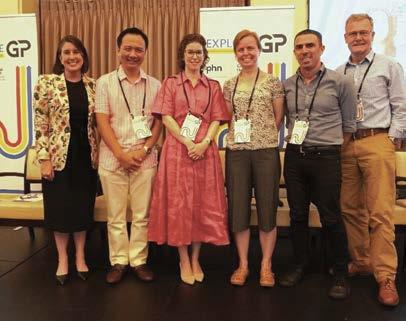
A News Magazine for all Doctors in the Canberra Region
ISSN 13118X25
All electoral matter in this edition of Canberra Doctor is authorised by Peter Somerville on behalf of the Australian Medical Association (ACT) Ltd.
Published by the Australian Medical Association ACT Ltd
Level 1, 39 Brisbane Ave, Barton ACT 2600 (PO Box 560, Curtin ACT 2605)
Editorial Sarah Colyer sarah-colyer@ama-act.com.au
Design Angela Wood reception@ama-act.com.au
Advertising Ph 6270 5410 Fax 6273 0455 reception@ama-act.com.au
Contributions
Canberra Doctor welcomes reader contributions. Submit your stories to editorial@ama-act.com.au
By Dr Peter French
The sun, the earth & everything else,
Took 6 days of creation.
But then to torment mankind, The Devil invented atrial fibrillation.
In the journey from cradle to grave, Once only death & taxes were certain.
Now we have AF to entertain, Before that final curtain.
But there's no such thing as ‘just AF’, The arrhythmia has many faces. The good, the bad, the just plain ugly, The irregular pulse that races.
In Bombay, Beirut & Baghdad, The management is the same, Control the rate & thin the blood, Restoring normal rhythm can be an aim.
Choose an anticoagulant, Once
there were only a few. Now Antiplatelets, Warfarin & Heparin, Have been joined by some that are new!
And the reason to anticoagulate, Is to prevent embolic strife. Whilst a bleed may ruin your day, A stroke will ruin your life!
And in terms of rhythm control, Just line up & take your turn, There's a smorgasbords of options, We can poison, shock and burn. There are many tablets to take, With side effects to rue, Some cause lethargy, others Torsade, And one even turns you blue. And if the pills begin to fail, & the rhythm stays out of whack, Just call the electric twiddlers, They'll give your heart a zap
But if they zap, then zap again, And AF won't go away,
The ANU MedRevue, performed live over three killer nights, is the absolute cornerstone event of the ANU Medical School calendar. A whopping 100 students are involved with this year’s production, titled ‘The Doccy Horror Picture Show’.

Contact
Disclaimer
Audiences are promised a “night of frights and delights” and “campy, thriller energy” as they follow the exhilarating journey of ANU new grad Dr Brad Majors and his lovely 4th-year girlfriend, Janet Weiss to the SAN, where they aspire to study under eccentric and experimental Neurosurgeon, Dr Frank N. Furter.
The show is entirely written, produced, directed, choreographed, and performed each year by medical students from all four year levels at
The Twiddlers change their tactics, They'll fight a different way
First EP checks the circuits, Then spot-welding with RFA, It’s like napalming the heart, To keep AFib at bay.
And during this you just lie there, With wires up every vein, They turn you on, they turn you off, Luckily, you're doped out of your brain.
So the management of AF Is a multi-disciplinary game. Because if all treatment fails, There are lots of people to blame So AF remains a puzzle With no easy answers today, Some poison, others burn, Some patients even pray.
And if anyone ever cures AF, He really will be clever. Because the difference between true love & AF, Is that AF is forever!

By Dr Tim Metcalf
In tense moments I wish my stethoscope was all they want it to be:
two steely serpents unwound from the physician’s staff, whispering answers in my ears. Reflected in the sterile metal I see this differently: forehead tethered to a frown by ostentatious earrings weighing me down like question-marks in lead.
Originally published in the The Lancet Vol 360 No 9344 November 9 2002 p1523.
the ANU Medical School. As always, all proceeds from the production go to Companion House, an incredible local Canberra charity which assists refugees and survivors of torture and trauma to rebuild their lives. The show will be held at Erindale Theatre on 29, 30 and 31 May, 7-10pm. For tickets, please scan the QR code.

Who learned, in the very first issue of his own magazine in 1962, that “with great power comes great responsibility”?
Who was the Nordic godlike hero that was the other identity of Manhattan’s limping Dr Don Blake?
What did Clark Kent often do in a phone booth in the 1930s and 1940s?
What is the superhero group name of crime fighters Black Canary, Oracle, Batgirl, and many others?
William Moulton Marston, New York psychologist and inventor of DiSC personality profiling, created which superhero iconic female character in 1940?
Which superhero has been played in many films by Scarlett Johansson?
Who loved, at various times, Lois Lane, Lana Lang, Lyla Lerrol and Lori Lemaris?
Which group did Janet Van Dyne co-found in 1963 in her identity as the Wasp, along with Captain America, Iron Man, Giant Man and the Hulk?
Maria Hill led which organisation?
Who moved from the Brotherhood of Evil Mutants to the X-Men, then to the Avengers, then accidentally destroyed the Universe (and I thought I was having a tough day!)?
See answers on page 15
Dr Julie Kidd
Weight, alcohol, insomnia, anxiety, cancer support etc.
Canberra Complementary Health Practice Suite 5, 108 Hawker Pl, Hawker, 2614 0425 300 233 | www.canberrahypnosis.com.au






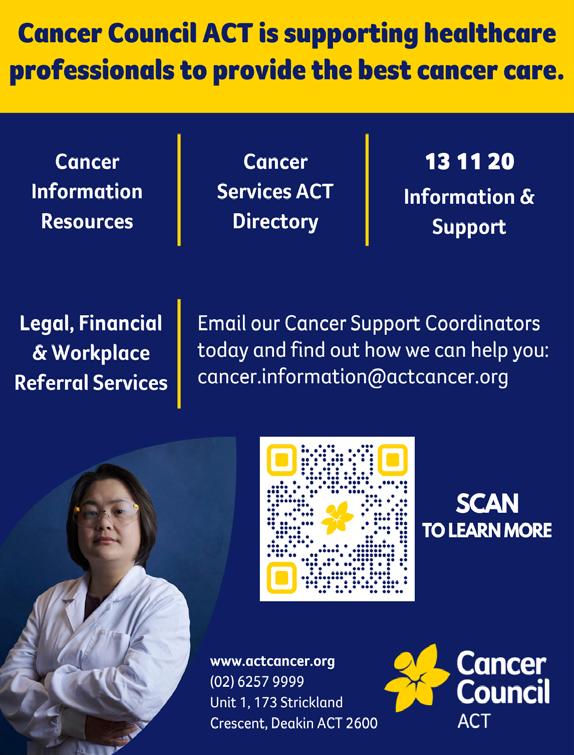
Medical Benevollent Association of NSW-ACT
Since 1896, doctors’ wellbeing has been the core of MBA NSW-ACT’s mission. Our long history means we understand the unique and varied challenges that medical practitioners face. Our experienced specialised social workers can guide you through life’s challenges, whether the adversity is personal or professional.
For assessment, counselling, information, and advocacy


MBA can provide limited funds during times of financial hardship.
Our support is strictly confidential, free, and independent of the regulators.
Please call 02 9987 0504 (Option 1) if you are facing an issue that is causing distress or if you want to explore options for a colleague. We are available Monday – Friday between 9am and 5pm and can schedule after hours appointments. You can elect to remain anonymous.
Help Us Help Others: If you don’t need our help now, please consider supporting our charity to continue this vital work, by making a tax-deductible donation.



